MASLD Pharmacotherapy With Gabriella McCarty
Chat with MASLD AI

Hi, I am MASLD AI.
Suggested Questions :

MASLD AI 08:35 PM

In this presentation, Gabriella McCarty, NP at North Shore Gastroenterology, explores the evolving management of Metabolic Dysfunction–Associated Steatotic Liver Disease (MASLD) and MASH with a focus on pharmacotherapy. Drawing from her 26 years in gastroenterology, IBD, and hepatology, she explains how fatty liver disease is often detected incidentally and highlights the importance of early diagnosis and patient education. Gabriella reviews the three-pillar approach to treatment—lifestyle and weight loss strategies, cardiovascular risk reduction, and emerging liver-directed therapies. She discusses the role of GLP-1 receptor agonists, Vitamin E, Pioglitazone, and the first FDA-approved therapy, Resmetirom, detailing their mechanisms, benefits, and safety considerations. With insights from the MAESTRO-NASH trial and real-world experience using non-invasive tests like FibroScan, CAP scores, and ELF testing, this session provides practical guidance for clinicians managing MASLD/MASH and preventing disease progression to cirrhosis or hepatocellular carcinoma.
Related Podcast

HCC Surveillance: Implementation in Patients with Advanced Fibrosis/Cirrhosis from MASH

In this expert-led session, Elizabeth Alqueza, PA-C, from Beth Israel Deaconess Medical Center in Boston, discusses the critical importance of hepatocellular carcinoma (HCC) surveillance in patients with steatotic liver disease, including MASLD and MASH. HCC is a leading cause of cancer-related death worldwide, and early detection is vital for improving survival outcomes. Using a real-world case study, Elizabeth highlights risk factors such as obesity, type 2 diabetes, and advanced fibrosis—and underscores the growing role of MASH in HCC development, even in the absence of cirrhosis. She outlines best practices for staging, the importance of early referral to hepatology, and AASLD-recommended surveillance protocols using ultrasound and AFP testing every 6 months. The video also explores systemic barriers to screening and actionable strategies to improve adherence, such as EMR alerts, streamlined imaging protocols, and improved coordination between primary care and hepatology. This presentation is essential viewing for healthcare professionals managing patients with liver disease, offering practical tools to enhance HCC detection and optimize long-term outcomes.
Watch Now
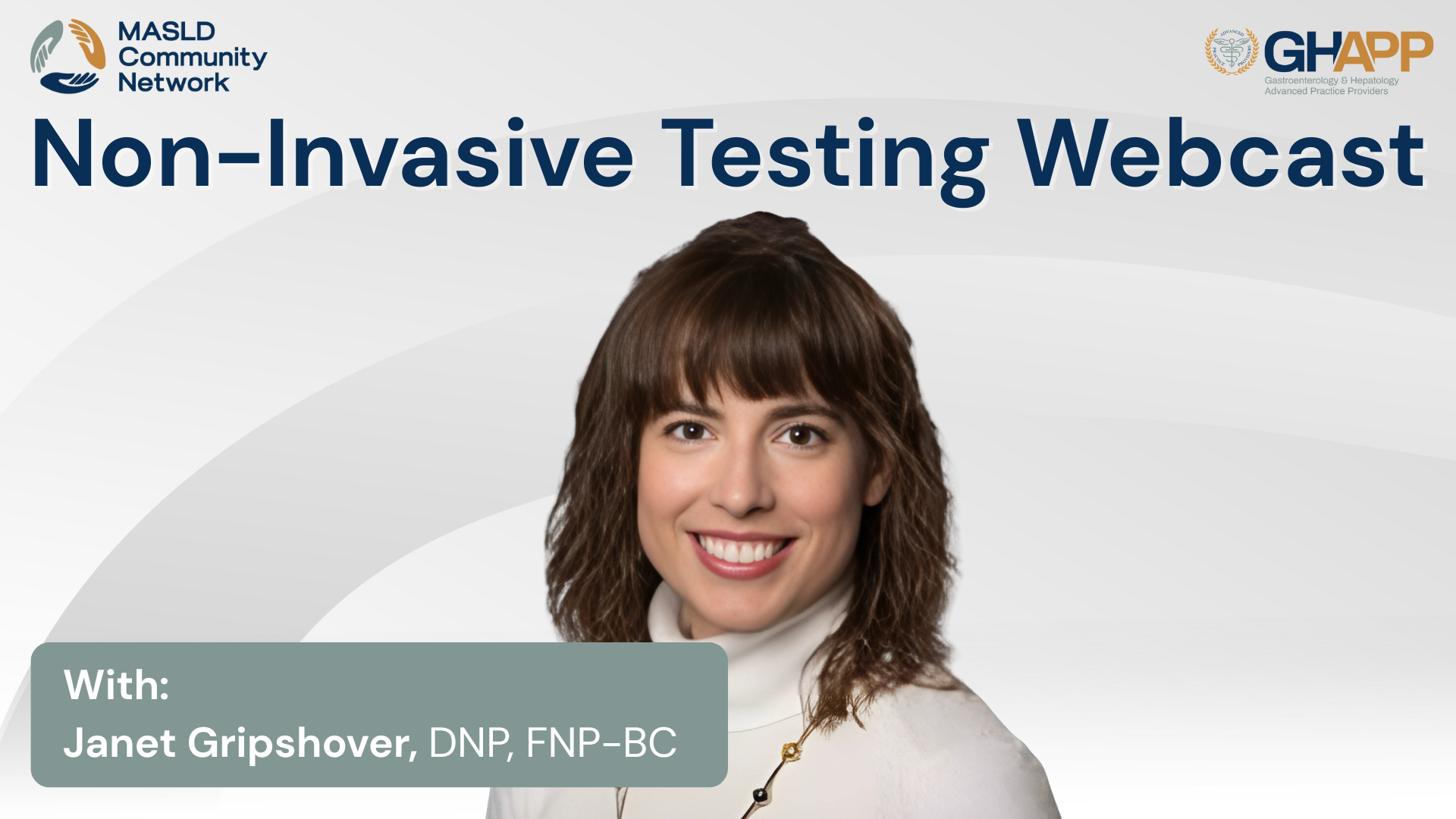
Non-Invasive Testing With Janet Gripshover

In this in-depth and practical discussion, Janet Gripshover, NP from Cedars-Sinai in Los Angeles, explores the evolving role of non-invasive testing (NITs) in the diagnosis and risk stratification of MASLD (Metabolic dysfunction-associated steatotic liver disease) and MASH (Metabolic dysfunction-associated steatohepatitis). Drawing from real-world experience and a case study involving a 65-year-old patient with multiple cardiometabolic risk factors, she breaks down the latest 2025 approaches to fibrosis assessment—highlighting the use of FIB-4, ELF score, vibration-controlled transient elastography (FibroScan®), and MR elastography. Gryover also emphasizes how combining tests across modalities can improve accuracy and patient care while avoiding the risks of liver biopsy. Learn how liver stiffness, lab values, and clinical history all intersect to guide care and treatment decisions in patients with fatty liver disease. This session is part of the MASLD/MASH Community Network and is ideal for providers, specialists, and anyone interested in the forefront of liver disease management.
Watch Now
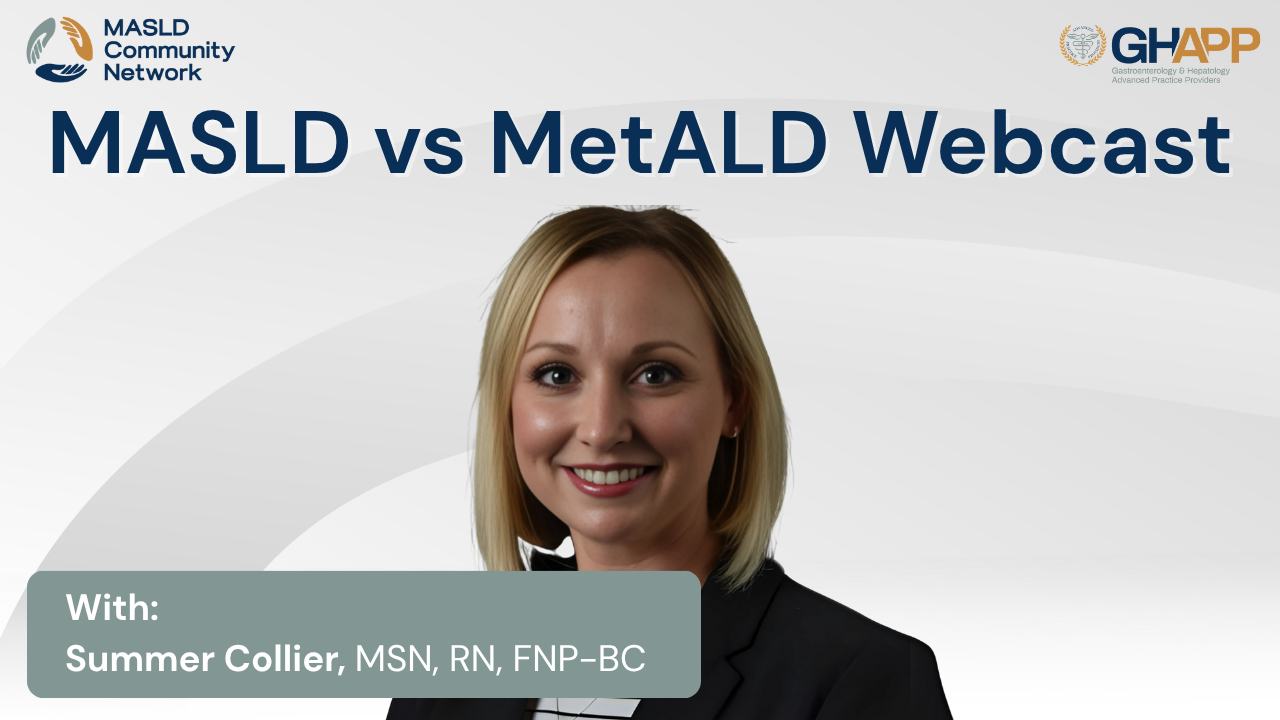
MASLD vs MetALD With Summer Collier

In this educational session from the GHAPP MASLD Community Network, Summer Collier, NP at UC San Diego Health, explores the overlap between metabolic dysfunction–associated steatotic liver disease (MASLD) and metabolic dysfunction plus alcohol-associated liver disease (MetALD) through a detailed clinical case study. Using real-world patient data, she highlights key considerations for evaluating, diagnosing, and managing steatotic liver disease, with special focus on teasing out the dual drivers of metabolic risk factors and alcohol consumption. Viewers will learn about diagnostic tools such as FibroScan, CAP scores, and PEth testing, and how these objective biomarkers help distinguish true MASLD from alcohol-driven disease. The discussion also covers pathophysiology, risk of fibrosis progression, patient counseling on lifestyle and alcohol cessation, current treatment recommendations, and hepatocellular carcinoma (HCC) screening in advanced fibrosis. Whether you are a hepatology provider, APP, or clinician interested in MASLD and MetALD, this session provides practical insights into patient education, disease classification, and the importance of standardized definitions for clinical care and research.
Watch Now

APP Insight: Misconceptions About Liver Health

In this video, Gabriella McCarty, NP-C, of Northshore Gastroenterology in Cleveland, Ohio, tackles common misconceptions surrounding fatty liver disease, also known as MASLD (Metabolic Dysfunction–Associated Steatotic Liver Disease). Drawing from her clinical experience, Gabriella highlights how fatty liver is often an incidental finding during routine GI visits, even when patients present for unrelated concerns like GERD or colon screenings. She emphasizes that MASLD is not caused by alcohol, but instead driven by metabolic risk factors such as obesity, diabetes, high cholesterol, and hypertension. Gabriella dispels the myth that normal liver enzymes indicate a healthy liver, explaining that liver markers are often unreliable in detecting advanced fibrosis or cirrhosis. She also warns against unregulated liver detox products and the outdated belief that fatty liver is harmless. With MASLD now the most common liver disease worldwide and increasing rates among younger populations, Gabriella stresses the importance of early screening, lifestyle modification, and patient education. This is a must-watch for anyone looking to better understand the silent progression of fatty liver disease and the tools available for timely intervention.
Watch Now
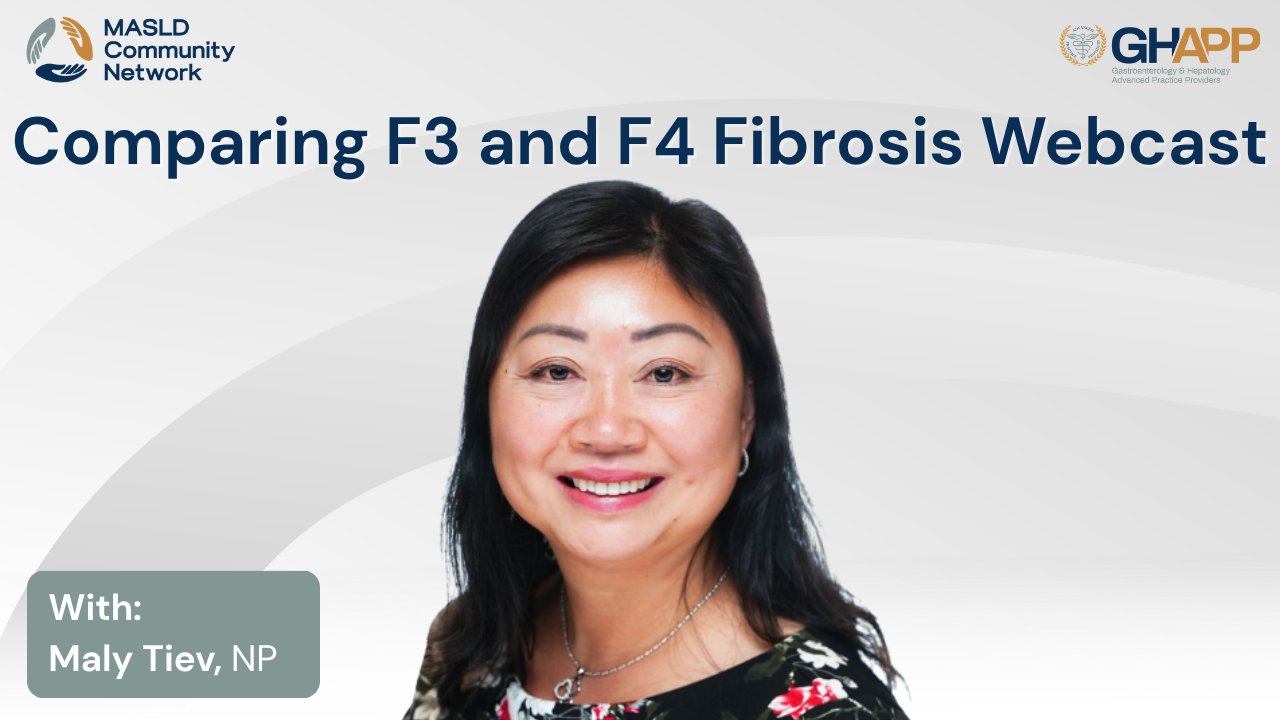
Comparing F3 and F4 Fibrosis With Maly Tiev

Maly Tiev, NP, reviews two real-world cases to explain the critical differences between F3 advanced fibrosis and F4 cirrhosis in patients with MASLD/MASH, and how accurate staging changes treatment, prognosis, and surveillance strategies. Using non-invasive tests (NITs) such as FIB-4, FibroScan/Liver Stiffness (kPa), CAP, and the ELF test, she demonstrates how concordant results can guide management without biopsy, when discordant results may require further imaging or histology, and why platelet count and bilirubin trends are key for identifying cirrhosis. For patients with F3, Maly highlights the importance of lifestyle modification with 7–10% weight loss, diet and exercise counseling, optimization of type 2 diabetes and lipid control, potential use of GLP-1 therapy, and when resmetirom (FDA-approved for MASH with F2–F3 fibrosis) may be considered, along with repeat NITs for monitoring. For patients with F4, management shifts to cirrhosis care, including twice-yearly HCC surveillance (ultrasound ± AFP), variceal screening guided by liver stiffness and platelet thresholds, and strict emphasis on alcohol avoidance and cardiometabolic risk reduction, noting that resmetirom is not used in cirrhotic patients. This case-based discussion provides clinicians, APPs, and hepatology teams with practical tools to approach staging, risk stratification, and surveillance in MASLD/MASH.
Watch Now
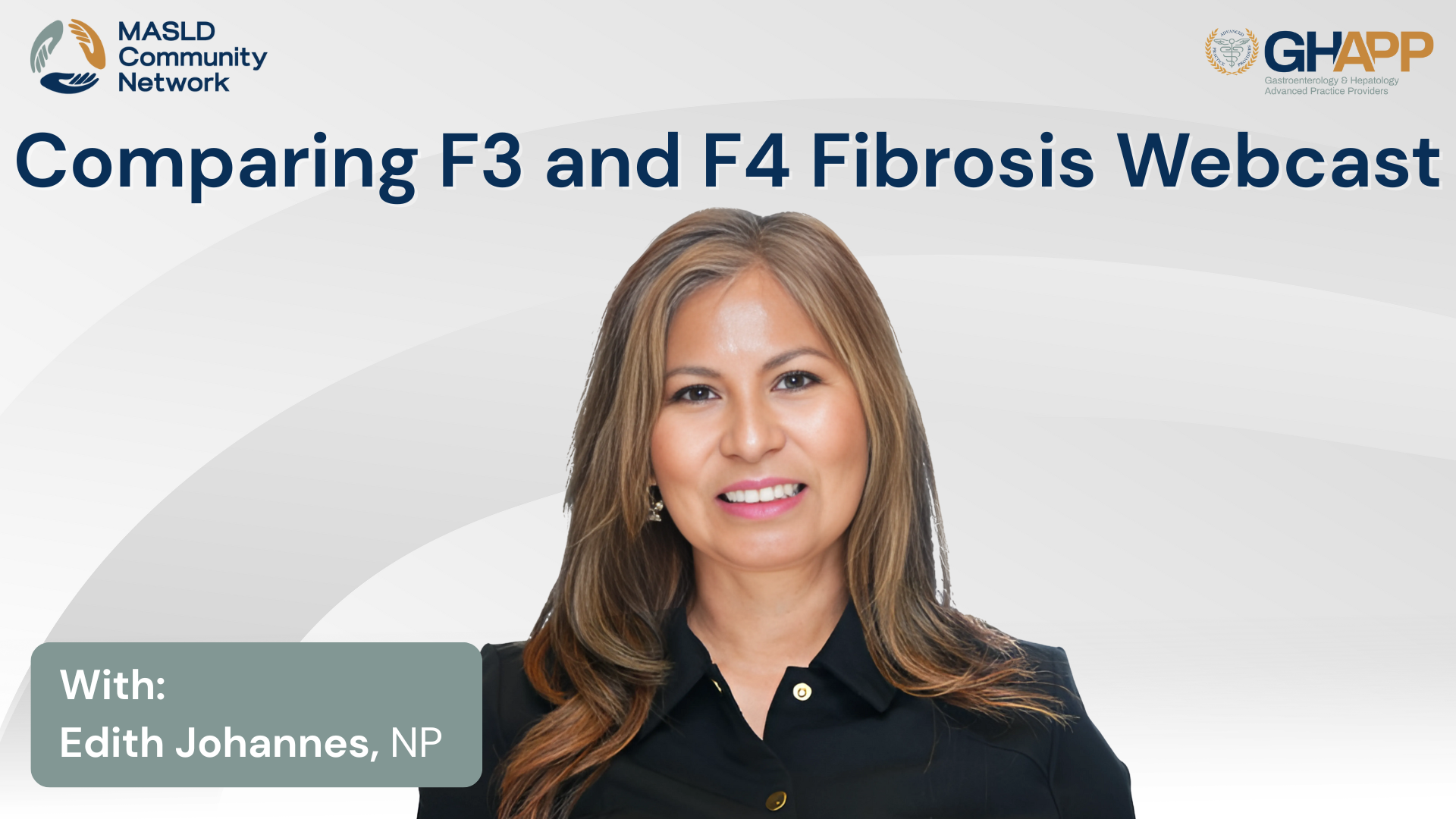
Comparing F3 and F4 Fibrosis With Edith Johannes

Join Edith Johannes, NP from UCLA Health, for a comprehensive and approachable introduction to MASLD (Metabolic Dysfunction-Associated Steatotic Liver Disease)—formerly known as NAFLD—and how to accurately diagnose it. Designed for primary care providers and early learners in hepatology, this session outlines the fundamental criteria for diagnosing MASLD and MASH, the importance of ruling out alternate causes of hepatic steatosis, and the key role of cardio-metabolic risk factors. Edith discusses how to apply non-invasive testing tools such as the FIB-4 score, ELF test, and elastography to determine fibrosis stage, along with guidance on when to consider liver biopsy and refer to hepatology. The presentation also explores the overlap between MASLD and alcohol-related liver disease, addresses the impact of genetic risk factors like PNPLA3 (particularly in Hispanic populations), and reinforces the urgent need for early detection to prevent cirrhosis and liver cancer. With clinical pearls and case-based examples, this session helps clinicians feel confident in evaluating patients for MASLD and navigating next steps for care.
Watch Now

Podcast: Pharmacotherapy for MASH/MASLD: An Overview

In this informative episode, Lindsay Yoder, PA, a hepatology expert at Indiana University, provides a comprehensive overview of current pharmacotherapy options for MASH (Metabolic Dysfunction–Associated Steatohepatitis), focusing on the first FDA-approved medication, resmetirom (brand name: Rezdiffra). Speaking directly to the MASLD/MASH Community Network, Lindsay breaks down the key histologic endpoints that led to resmetirom’s conditional approval—namely, fibrosis improvement without worsening of steatohepatitis, and MASH resolution without worsening fibrosis. She shares real-world data from clinical trials showing that resmetirom nearly doubles the rate of fibrosis improvement and triples MASH resolution compared to placebo. Lindsay also explains how the drug works: as a thyroid hormone receptor beta agonist, resmetirom improves hepatic lipid metabolism, reduces liver fat, and dampens inflammation—all key drivers of MASH progression. She outlines ideal patient criteria (stage F2–F3 fibrosis without cirrhosis), safety considerations, tolerability, potential side effects, and statin interactions. With an emphasis on combining pharmacotherapy with lifestyle changes, this episode serves as a practical guide for clinicians treating patients with MASH who qualify for advanced intervention.
Watch Now

APP Insight: Common Questions from Primary Care Providers About MASH

In this informative video, Michelle Barnett, PA-C, a hepatology expert based in Colorado Springs, answers frequently asked questions about elevated liver enzymes in the context of MASH (Metabolic Dysfunction–Associated Steatohepatitis) and MASLD (Metabolic Dysfunction–Associated Steatotic Liver Disease). She breaks down how to interpret common liver enzyme patterns—such as ALT greater than AST versus AST greater than ALT—and what these patterns may indicate, from MASH to alcohol-related liver disease and other potential causes like autoimmune hepatitis or drug-induced liver injury. Michelle outlines how to perform a thorough workup, including patient history, medication review, and physical exam findings, and emphasizes the importance of using tools like FIB-4 and abdominal ultrasound to assess for fibrosis and portal hypertension. The discussion also covers the clinical value of GGT, alkaline phosphatase, bilirubin, albumin, and platelets in evaluating liver function. Michelle shares practical guidance on when to refer patients to hepatology and how to monitor liver enzymes over time, particularly in those undergoing lifestyle changes or pharmacologic treatment. This comprehensive Q&A is an essential resource for providers managing patients with suspected or confirmed metabolic liver disease.
Watch Now
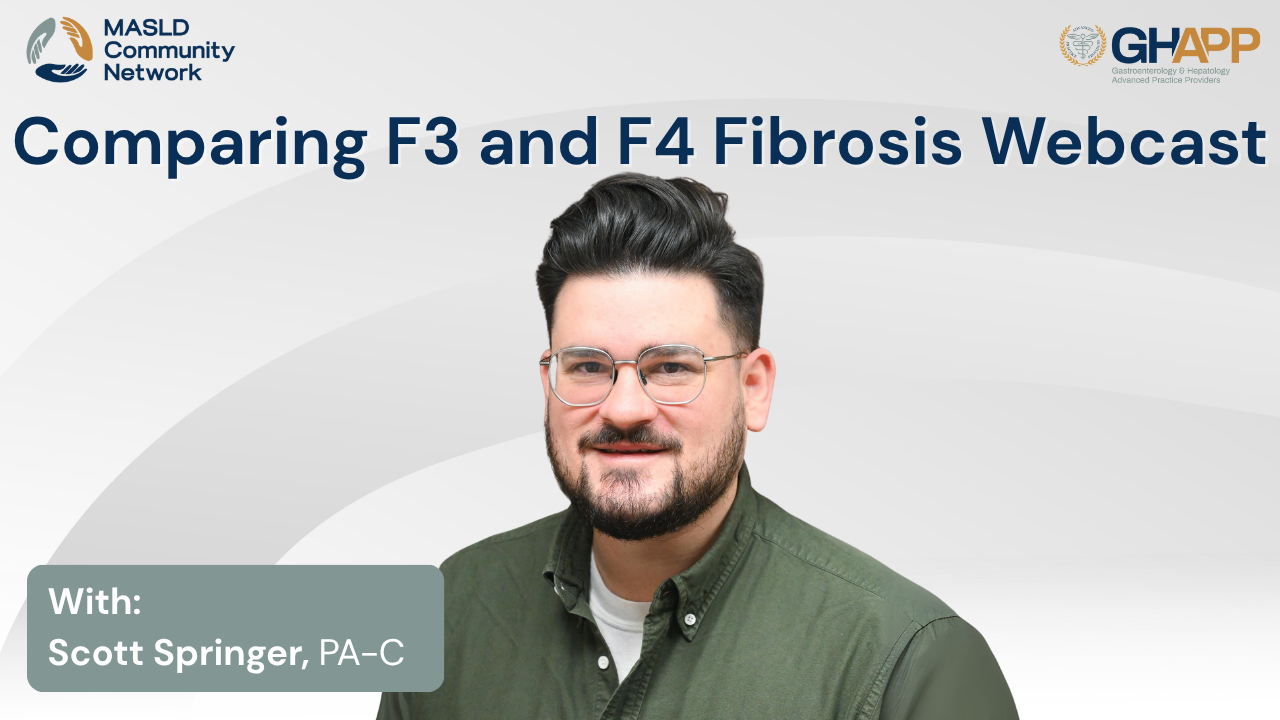
Comparing F3 and F4 Fibrosis With Scott Springer

Join Scott Springer, PA-C, from Erie County Medical Center in Buffalo, NY, for a case-based clinical discussion on how to evaluate and manage F3 vs. F4 fibrosis in patients with Metabolic Dysfunction-Associated Steatotic Liver Disease (MASLD) and MASH, presented through the GHAPP MASLD/MASH Community Network and sponsored by Madrigal Pharmaceuticals. Using a detailed side-by-side comparison of a fictional patient "Sam," Scott demonstrates how to interpret key non-invasive testing modalities—including FIB-4, ELF, and FibroScan—to stage liver fibrosis, determine candidacy for emerging therapies like resmetirom (Rezdiffra), and identify when liver biopsy may still be necessary. Learn how changes in platelet count, ELF score, and liver stiffness (kPa) help distinguish advanced fibrosis (F3) from cirrhosis (F4) and how this affects treatment decisions, HCC surveillance, and portal hypertension management. Scott also emphasizes the role of GLP-1 therapy, aggressive cardiometabolic risk reduction, and lifestyle counseling as core strategies in MASLD care. This session is a practical guide for GI and hepatology providers navigating MASLD staging, treatment eligibility, and long-term monitoring in 2025 and beyond.
Watch Now
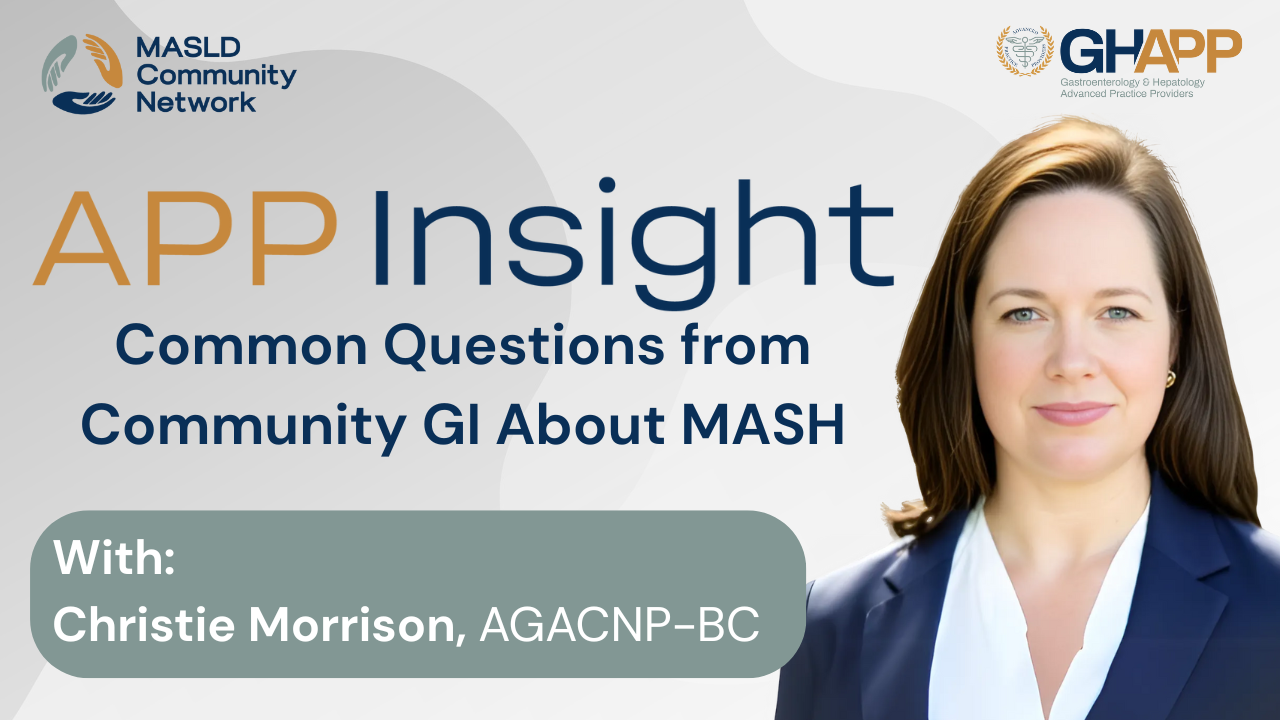
Common Questions from Community GI About MASH

In this insightful video, Christie Morrison, a local advanced practice provider with the GHAPP MASLD/MASH Community Network, answers two of the most frequently asked questions from community GI providers: when to refer patients with MASH to a transplant center and how to evaluate liver fibrosis when FibroScan® isn’t accessible. Christy emphasizes the importance of using non-invasive testing (NITs)—including FIB-4 and ELF (Enhanced Liver Fibrosis) scores—to help identify patients with F3 fibrosis, who are at higher risk for rapid progression to cirrhosis and hepatocellular carcinoma (HCC). She encourages early referral to transplant hepatology to avoid delays in care, especially given long wait times and the value of multidisciplinary support teams at transplant centers. For clinicians without access to FibroScan, Christy shares practical alternatives such as ordering reflex testing to ELF via major labs and leveraging easy-to-use digital tools like MDCalc for FIB-4 calculation. This episode is a valuable resource for GI providers looking to optimize liver care pathways and prevent late-stage complications in MASLD and MASH patients.
Watch Now





 August 2025
August 2025 